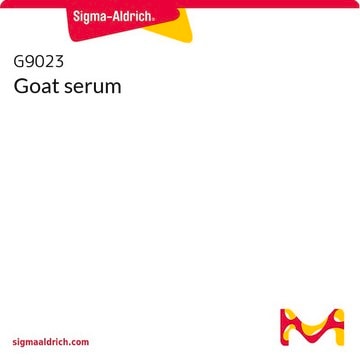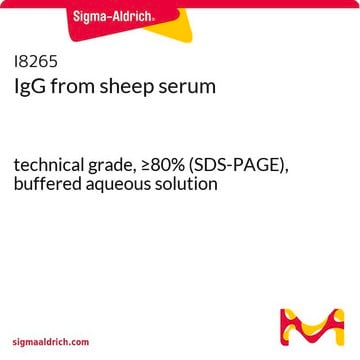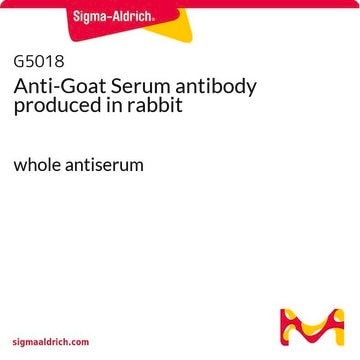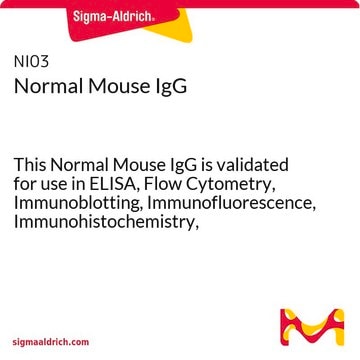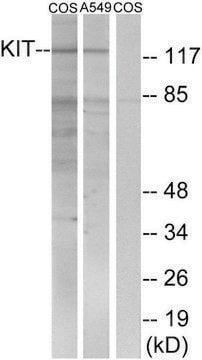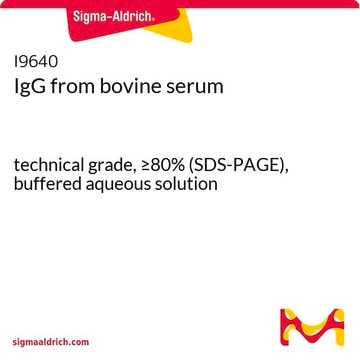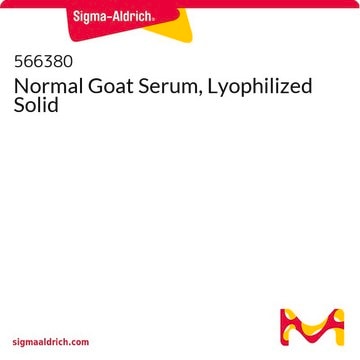I5256
IgG from goat serum
reagent grade, ≥95% (SDS-PAGE), essentially salt-free, lyophilized powder
Synonym(s):
Goat IgG
Sign Into View Organizational & Contract Pricing
All Photos(2)
About This Item
Recommended Products
conjugate
unconjugated
grade
reagent grade
Assay
≥95% (SDS-PAGE)
form
essentially salt-free, lyophilized powder
storage temp.
2-8°C
target post-translational modification
unmodified
Looking for similar products? Visit Product Comparison Guide
General description
IgG antibody subtype is the most abundant serum immunoglobulins of the immune system. It is secreted by B cells and is found in blood and extracellular fluids and provides protection from infections caused by bacteria, fungi and viruses. Maternal IgG is transferred to fetus through the placenta that is vital for immune defence of the neonate against infections
Goat IgG is purified from normal goat serum by fractionation and ion-exchange chromatography.
Goat IgG is purified from normal goat serum by fractionation and ion-exchange chromatography.
Application
Purified IgG may be used as a reference antigen, standard, blocking agent or coating protein in a variety of immunoassays including ELISA, dot immunobinding, Western immunoblotting, immunodiffusion and immunoelectrophoresis. Other applications include starting materials for the preparation of immunogens and solid-phase immunoadsorbents. Goat IgG was used as negative control in immunohistochemical analysis of human heart tissue samples and in preparation of egg-white avidin samples for atomic force microscopy. Goat IgG was used as isotype control antibody in immunohistochemical analysis of tissue sections of human tonsils, colon, small intestine, ileus and spleen.
Disclaimer
Unless otherwise stated in our catalog or other company documentation accompanying the product(s), our products are intended for research use only and are not to be used for any other purpose, which includes but is not limited to, unauthorized commercial uses, in vitro diagnostic uses, ex vivo or in vivo therapeutic uses or any type of consumption or application to humans or animals.
Storage Class Code
11 - Combustible Solids
WGK
WGK 3
Flash Point(F)
Not applicable
Flash Point(C)
Not applicable
Personal Protective Equipment
dust mask type N95 (US), Eyeshields, Gloves
Certificates of Analysis (COA)
Search for Certificates of Analysis (COA) by entering the products Lot/Batch Number. Lot and Batch Numbers can be found on a product’s label following the words ‘Lot’ or ‘Batch’.
Already Own This Product?
Find documentation for the products that you have recently purchased in the Document Library.
Customers Also Viewed
Marlene Brandes et al.
Blood, 102(10), 3693-3701 (2003-07-26)
gamma delta T cells are inadequately defined both in terms of their migration potential and contribution to antimicrobial immunity. Here, we have examined the migration profile of human blood gamma delta T cells and related cell lines and correlated these
Mark A Birrell et al.
Journal of immunology (Baltimore, Md. : 1950), 181(6), 4265-4271 (2008-09-05)
The liver X receptors (LXRalpha/beta) are orphan nuclear receptors that are expressed in a large number of cell types and have been shown to have anti-inflammatory properties. Nuclear receptors have previously proved to be amenable targets for small molecular mass
Virginie Gridelet et al.
Reproduction, fertility, and development, 25(3), 511-522 (2013-03-08)
The present study investigated the first interaction that occurs between the blastocyst and endometrium during implantation. Given the ethical objections to studying implantation in humans, a mouse model was used to study the dialogue between luteinising hormone (LH) and luteinising
Diana Di Mattia et al.
Veterinary dermatology, 29(3), 212-e76-212-e76 (2018-03-27)
Head and neck ulcers in cats can arise from allergic and nonallergic disorders, including feline leishmaniosis (FeL). It is important to rule out this aetiological agent in regions that are endemic for canine leishmaniosis, because the drugs used to treat
Hannah Aucott et al.
Journal of innate immunity, 10(3), 215-227 (2018-02-27)
Neuroinflammation triggered by infection or trauma is the cause of central nervous system dysfunction. High-mobility group box 1 protein (HMGB1), released from stressed and dying brain cells, is a potent neuroinflammatory mediator. The proinflammatory functions of HMGB1 are tightly regulated
Our team of scientists has experience in all areas of research including Life Science, Material Science, Chemical Synthesis, Chromatography, Analytical and many others.
Contact Technical Service




